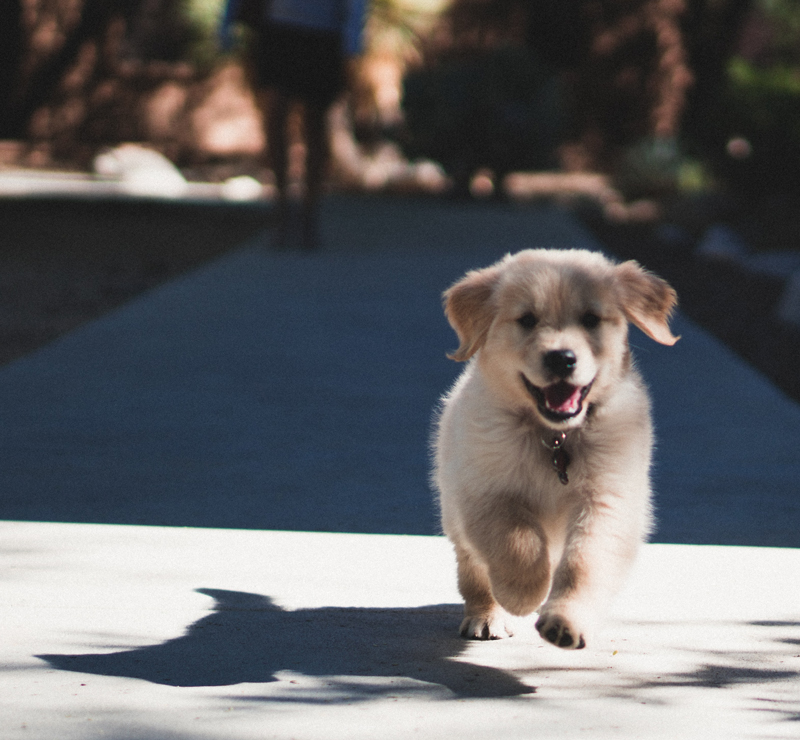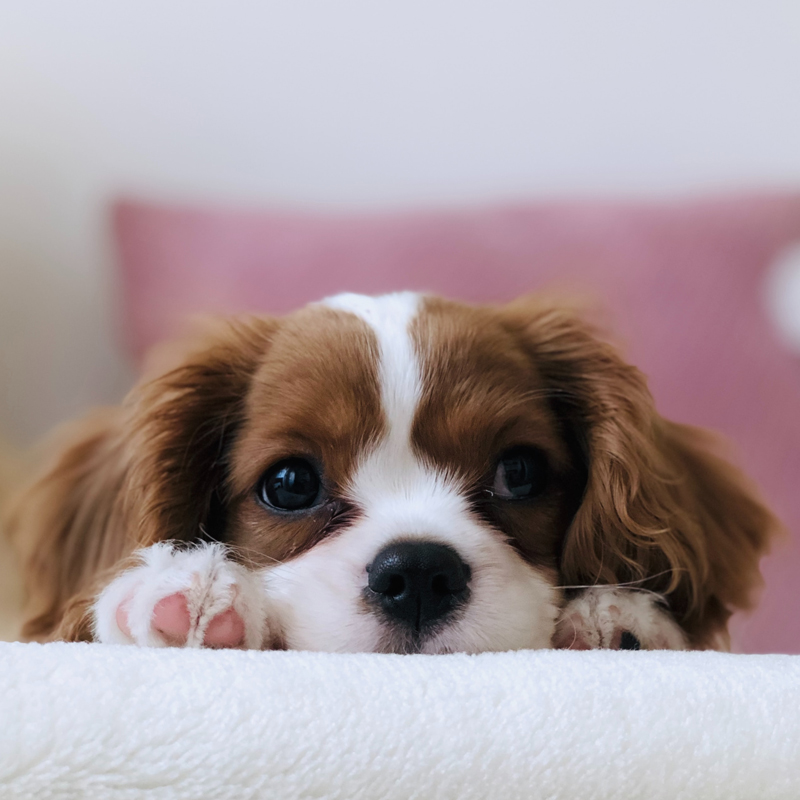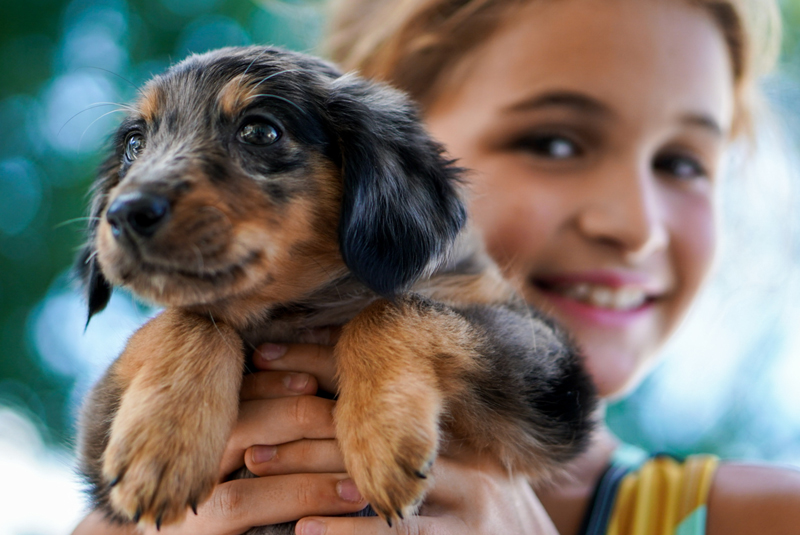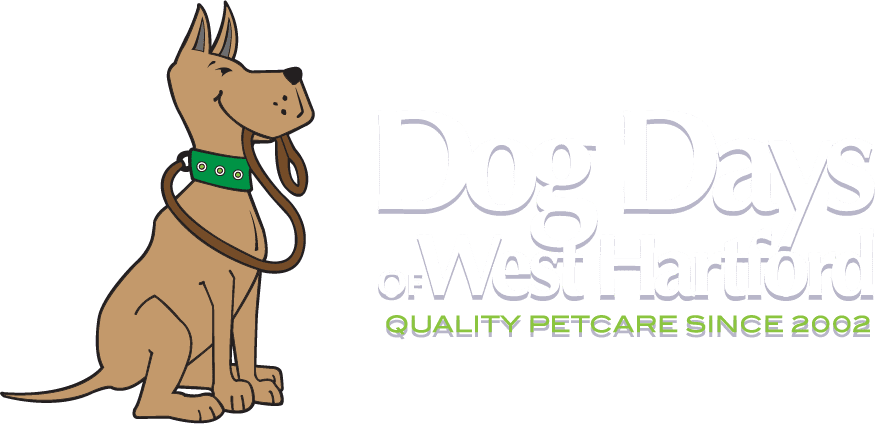Getting Started With A New Puppy
Is there anything better than a new puppy? If you’ve just brought one home, you’re in store for a lot of licks, laughs, and love. But with all the joy comes a lot of responsibility. Whether your new puppy is your very first pet or you just need to brush up before adding another furry family member, here’s what you need to know:

Puppy Proof Your Home
You’ve probably heard that getting a puppy is a lot like having a baby—and with good reason. Puppies need a lot of care and oversight to stay safe and healthy. Remember, anything a pup can chew on, he will. To prevent any unwanted accidents, take preventative action before you bring your pup home. Breakable items, power cords, and potential toxins (like household chemicals, certain plants, pharmaceuticals, and harmful human foods) should be placed out of reach. Baby gates are a smart way to keep dogs away from certain rooms or stairs as well.
Get Your Supplies Ready
It’s a smart idea to have your puppy essentials already in your home when you first bring your new furry friend home. This includes a leash and collar with an I.D. tag, food and water bowls, chew toys, a comfy dog bed, and if you choose, a crate or kennel. If you choose a larger kennel for when your pup is full-grown, block off the extra space with cardboard or other harmless obstruction to make it smaller and more secure feeling.

Welcome Them Home Gently
When you first arrive at your home, allow your pup to go to the bathroom before you bring her inside (and reward them when they do)—keeping the leash on them the whole time. Once inside, sit with her either on the floor (or couch if she’s allowed) and give her loving pets and vocal affection so she gets to know the sound of your voice and used to being touched by you. Remember to bring her out frequently to relieve herself; puppies haven’t developed control (see housetraining below) and may have an accident when excited.
Let Them Discover Their Crate
There are several reasons why you might choose to crate train your dog. Many dogs feel safe in a small, den-like atmosphere that’s all their own. Let your new pup explore their crate by spending a short amount of time in it. This gives them time to process their new surroundings while you slowly introduce them to their new space.
Puppy Chow Time
How you choose to feed your puppy can make a big difference in his or her health. From grain-free to raw diets to good old-fashioned kibble, there’s a lot on the market. It can be confusing on what’s best. Do your research to understand puppy nutritional requirements and the different foods on the market: ask your vet, talk to your pet-owning friends, and read up online. Remember that dog food is a big business, just because an item is well-marketed doesn’t mean it’s the right choice for your pet. Do make sure to choose puppy formulas versus adult or senior blends, and if you need to switch brands, do so gradually to prevent stomach upset or finicky eating patterns.
The First (And Second And Third) Trip to the Vet
Taking your new puppy for a general exam within the first few days of arrival is necessary to establish good health, so choose your family veterinarian before you bring her home. Make sure to take gentle steps for a good experience, helping your puppy be less fearful of future visits. Within the first six months, you will likely make several trips so your pup can be vaccinated, tested for parasites (which can be very common in puppies), get spayed or neutered, get appropriate flea and tick prevention, and (optionally) be microchipped.
Housetraining
Puppies generally can’t control their bladders or bowels until they are about 12 weeks old, but you can still begin housetraining from the very start. It takes a bit of time and a lot of patience but by establishing a routine early on, your dog will know what to do once they gain bodily control. As a general rule, bring your puppy to the designated “potty spot” immediately first thing in the morning, after eating or drinking, after waking from a nap, after playtime, after chewing a toy, and last thing at night. Establishing set meal times will help you predict when a potty break will be needed. Remember, there will be accidents, so stay calm and steady in your approach.

Get Social
Getting your puppy used to new people, settings, and situations positively is the first step in raising a well-behaved and happy dog. The first few weeks of a pup’s life are critical for this kind of development, teaching them to be calm and accepting down the road.
Handling: Get your dog used to being touched by handling their paws, ears, tail, belly, etc. This will help them to accept medical exams as well as pets from well-meaning strangers.
Meeting other dogs: It’s smart to slowly introduce other dogs to your puppy before they learn to fear them, but check with your vet regarding vaccination status before you do. Likewise, busy places like the dog park might be overwhelming. Start with a doggy play date with only one other dog, keeping them both on leash until they are comfortable.
Meeting new people: Introducing your dog to a variety of different people will help them adjust to being in the real world. This includes things you might not realize, including folks in uniforms, sunglasses, raincoats and umbrellas, hats, or those with disability equipment like wheelchairs and walkers.
Establish A Hygiene Routine
General canine hygiene helps with overall health and well-being, and getting your dog adjusted to it early will significantly impact how they handle it down the road. This includes bathing, grooming, trimming nails, cleaning ears, brushing teeth, and providing durable and safe toys. Different breeds have different grooming requirements, but generally, puppies shouldn’t be bathed more than once a month to prevent dry skin. When you do bathe your pup, be sure to choose a puppy-formulated shampoo (and do not use products intended for humans).
Bond with Your New BFF (Best Furry Friend)
The bond with your new dog begins the moment you bring him or her home and grows stronger every day. Nurture it with daily walks and routines, showing them affection, engaging in playtime, signing them up for behavior or agility training, or even just enjoying nightly snuggles. While puppies can be a lot of work, this bond is what it’s all about. By taking the right steps from the beginning, you’ll be rewarded with a lifetime of unconditional love and friendship.
